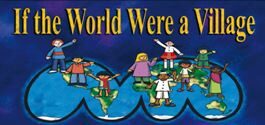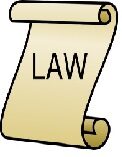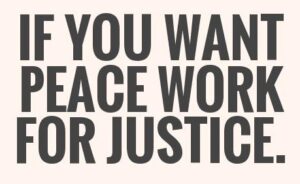If the world was a village with 100 people in it;
– 61 people would come from Asia
– 13 from Africa, 13 from the Americas
– 12 from Europe and 1 from Australasia
– 27 of the people would be under 15 and just 7 of them over 64
Half of the people would speak one of just 8 languages – and the most common language would be Chinese
63 village people would not have running water in their homes
18 people would not be able to read or write
53 villagers would have less than £1.30 a day to live on
There would be 18 cars in the village
Think about…
What do you find surprising about these statistics?
What we take for granted in our lives that many people live without?
What you think is unjust?
What you think could be done to make the world a more just place for everyone?
Justice in The Bible
Biblical justice is more than fairness and equality, it is a strong bias towards the weak, the poor and the socially disadvantaged who are cared for, whether they ˜deserve’ it or not. All have a right to life, freedom, and dignity. In God’s eyes every person is precious and oppression or discrimination, on any grounds, has no place (Exodus chapter 23 verses 2,6). God’s justice is gracious.” He always acts justly and he calls on people to do the same. Justice is often interpreted in terms of seeking rights for oneself or one’s own group (˜we demand justice’) when biblically it is really an action on behalf of others. This does not mean that one has to ignore injustices to oneself, but it does shift the focus. ˜Justice’ is not for ˜just me’. This means that Christians will be more keen to protect others than themselves and will always wish to see right prevail. Justice builds a community where everyone’s well-being is bound up with that of everyone else. Without true Justice there cannot be true Peace.
What are we learning about justice at school?
At school we teach our children that Justice is more than just making things fair.
We show children that in order to live together well in a community, it is important to have rules or laws that everybody sticks to. We ask children to imagine if there were no rules for people driving cars.
Our curriculum seeks to help our children-
– Be aware of global justice issues
– Support charities through their own efforts. Take responsibility for each other in the school community
– Develop a sense of responsibility towards their “neighbours” near and far
– Make our school an inclusive community for all
– Be compassionate and help for those who have made mistakes
At school we talk about-
– Why it is important to have rules and laws
– Rules and laws we think are unjust or not fair
– School and class rules we think are important
Our School Council discuss any school rules they think are unfair. They ask Mr Briggs when they think rules need changing.








